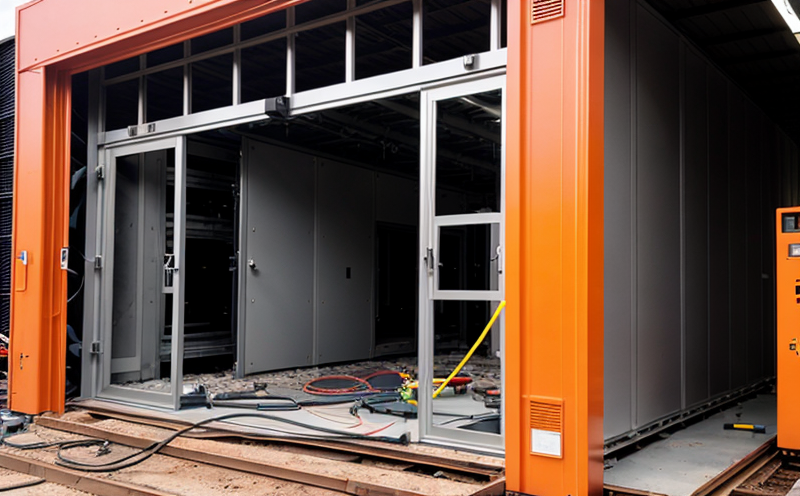UL 2054 Thermal Safety Testing of Household and Commercial Batteries
The UL 2054 standard is a critical benchmark in the battery safety industry. It ensures that batteries used in household and commercial applications are safe from thermal runaway events, which can lead to fire hazards or other dangerous situations. Compliance with this standard not only protects end-users but also demonstrates a commitment to quality and reliability.
The UL 2054 test method involves subjecting the battery to various heat sources under controlled conditions. The goal is to observe how the battery behaves during these stressors, particularly focusing on its ability to contain internal temperature increases without triggering an explosion or fire. This testing process includes multiple steps and considerations:
- Identification of potential thermal risks
- Evaluation of battery containment integrity
- Monitoring for signs of overheating or other anomalies
The standard is designed to simulate real-world conditions that could lead to thermal runaway. It covers a wide range of batteries, from lithium-ion used in electric vehicles (EVs) to nickel-metal hydride (NiMH) batteries found in consumer electronics. By adhering to this stringent protocol, manufacturers can ensure their products meet the highest safety standards.
Our laboratory specializes in providing comprehensive UL 2054 testing services for a variety of battery types and applications. From initial consultation to final report generation, we offer end-to-end support tailored to your specific needs. Our experienced team uses advanced instrumentation and follows strict procedures to ensure accurate results every time.
The importance of this test cannot be overstated. Thermal runaway can have severe consequences, not just for the battery itself but also for surrounding components and structures. By conducting thorough thermal safety tests like those outlined in UL 2054, manufacturers can identify potential weaknesses early on and address them before they become critical issues.
Our laboratory is equipped with state-of-the-art facilities that allow us to perform these tests under precise conditions. We employ highly skilled technicians who are well-versed in both the theoretical aspects of battery safety as well as hands-on testing techniques. This combination ensures reliable data collection and analysis, leading to more informed decision-making processes within your organization.
Compliance with UL 2054 is not just about meeting regulatory requirements; it's an investment in brand reputation and customer trust. When you choose us for your UL 2054 testing needs, you're partnering with a team committed to excellence and integrity throughout the entire process.
Why It Matters
The safety of batteries is paramount, especially given their increasing presence in everyday life—from electric vehicles to portable electronics. A single incident involving a defective battery can have far-reaching impacts, affecting public safety and consumer confidence alike. Therefore, implementing rigorous testing protocols like those defined by UL 2054 becomes essential.
By adhering to these standards, manufacturers demonstrate their dedication to producing safe products that meet global expectations for quality and reliability. Moreover, compliance with such stringent regulations can help mitigate legal risks associated with product liability lawsuits. It also enhances brand image and fosters long-term relationships with customers who value safety above all else.
In today's competitive market, demonstrating adherence to best practices is crucial for maintaining a strong reputation among stakeholders. Whether you're an established player or just beginning your journey in the battery industry, ensuring that your products pass UL 2054 testing sends a powerful message about your commitment to excellence and customer satisfaction.
Industry Applications
| Battery Type | Applications |
|---|---|
| Lithium-Ion (Li-ion) | Electric Vehicles, Smartphones, Laptop Computers |
| Nickel-Metal Hydride (NiMH) | Power Tools, Camcorders, Portable Speakers |
| Polymer Lithium-Ion (PLi-ion) | E-Scooters, Smartwatches, Medical Devices |
The UL 2054 standard is applicable across various sectors where batteries play a crucial role. Whether it's automotive manufacturers looking to enhance the safety of EVs or electronics companies aiming to improve the longevity and reliability of their devices, this test ensures that all components meet stringent safety criteria.
- Automotive industry: Ensures passenger safety by preventing fires in EV batteries
- Consumer electronics: Guarantees longer battery life and reduced risk of malfunction
- Medical equipment: Protects patients from potential hazards due to overheating or short circuits
These applications highlight the versatility and importance of UL 2054 testing in ensuring safe and reliable performance across diverse industries.
Quality and Reliability Assurance
- Thermal Stability: We assess how well batteries maintain their structural integrity under high temperatures.
- Containment Integrity: Ensures that the battery remains sealed properly to prevent leakage or exposure of internal materials.
In addition, we also conduct electrical resistance measurements and monitor voltage changes throughout the testing process. These metrics provide valuable insights into the overall performance and durability of each battery model tested.
The rigorous nature of UL 2054 ensures that only those batteries capable of passing all specified tests are approved for use in high-risk environments. This level of scrutiny helps maintain consistent quality standards across all products, contributing to greater trust among consumers and businesses alike.





